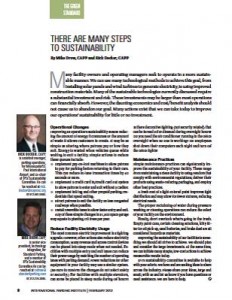 By Mike Drow, CAPP and Rick Decker, CAPP
By Mike Drow, CAPP and Rick Decker, CAPP
Many facility owners and operating managers seek to operate in a more sustainable manner. We can use many technological methods to achieve this goal, from installing solar panels and wind turbines to generate electricity, to using improved construction materials. Many of the sustainable technologies currently discussed require a substantial investment and risk. These investments may be larger than most operations can financially absorb. However, the daunting economics and cost/benefit analysis should not cause us to abandon our goal. Many actions exist that we can take today to improve our operations’ sustainability for little or no investment.
Operational Changes
Improving an operation’s sustainability means reducing the amount of energy it consumes or the amount of waste it allows customers to create. It may be as simple as altering where patrons pay or how they exit. Energy is wasted when vehicles queue while waiting to exit a facility. Simple actions to reduce these queues include:
- Implement pay-on-foot machines to allow patrons to pay for parking before returning to their cars. This can reduce
in-lane transaction times by 40 seconds or more. - Implement a credit card in/credit card out system to allow patrons to enter and exit without a cashier.
- Implement toll tag and other prepaid parking credentials that speed exiting.
- Direct patrons to exit the facility on less congested roadways when possible.
- Install reversible lanes to allow faster entry and exit.
- Any of these simple changes in a 1,500 space garage may equate to planting 173 trees per year.
Reduce Facility Electricity Usage
The most common electric improvement is a lighting upgrade. However, other actions also reduce electricity consumption. Many revenue and access control devices can be placed into sleep mode when not needed. Facilities with multiple entry and exit lanes can reduce their power usage by matching the number of operating lanes with parking demand. Power reductions for other equipment in your facility may use a similar system. (Be sure to confirm the changes do not affect safety or security.) For facilities with multiple elevators, can some be placed in sleep mode during off hours? Is there decorative lighting (not security related) that can be turned off or dimmed during overnight hours? Do you need the air conditioner running in the office overnight when no one is working? Do employees shut down their computers each night and turn off the office lights?
Maintenance Practices
Simple maintenance practices can significantly improve the sustainability of your facility. These range from maintaining a clean facility to using vendors that comply with environmental regulations, deliver their products using waste-reducing packaging, and employ other best practices.
A fresh coat of a light-colored paint improves light distribution and may allow for fewer fixtures, reducing electrical needs.
The proper reclaiming of water during pressure washing or cleaning operations can reduce the effect of your facility on the environment.
Finally, don’t overlook what’s going in the trash. Empty paint cans, certain cleaning solutions, kitty litter for oil pick-up, used batteries, and brake dust are all considered hazardous materials.
Improving the sustainability of our facilities is something we should all strive to achieve. We should plan and consider the large investments. At the same time, we can initiate many simple, low-cost actions to achieve measurable results today.
IPI’s Sustainability Committee is available to help with your efforts. We have and are seeking ideas to share across the industry. Please share your ideas, large and small, with us and let us know if you have questions or need assistance. We are here to help.
Rick Decker, CAPP, is assistant manager, parking operations, for Minneapolis/St. Paul International Airport, and co-chair of IPI’s Sustainability Committee. He can be reached at rick.decker@mspmac.org or 612.467.0460.
Mike Drow, CAPP, is senior vice president, technology integration, for Standard Parking, and a member of IPI’s Sustainability Committee.He can be reached at mdrow@standardparking.com or 312.274.2090.
TPP-2012-02-There are Many Steps to Sustainability
